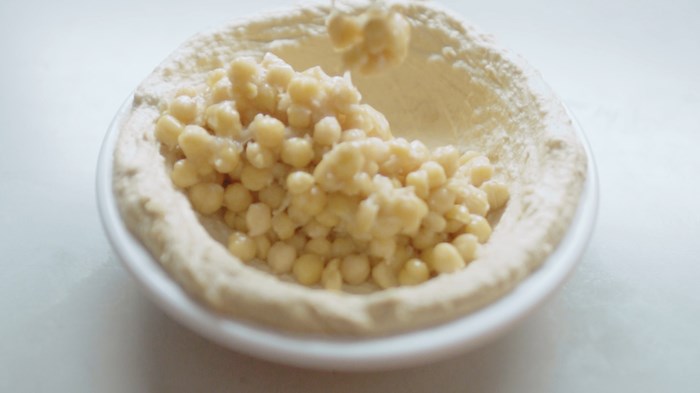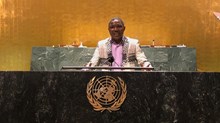Can Food Bring World Peace? This Palestinian Chef Thinks So.

A story in Michelle Reyes’ Becoming All Things has stuck with me. Reyes, an Indian-American, visited a home where her friend had chosen to display a yellow curry jar. Curious whether this woman had actually tried Indian cooking, Reyes asked about it.
The woman replied, “I bought that because the color makes the whole spice cabinet pop. Isn’t it pretty?… [but] I have no idea what I’d do with that. Isn’t curry a strong flavor? I would not want my kitchen smelling like that.”
Reyes recalls that the moment stung with insensitivity. Her friend was unthinking. Here was a symbol of Reyes’ history and culture, on display in a non-Indian kitchen, but not used, understood, or treasured other than as a pop of color.
Perhaps more significant, here was an opportunity not only to learn a bit more about the curry, but also to get closer to her friend. The host missed a chance to ask Reyes about it. It could have been a moment of connection.
Sharing food is an act of intimacy—one that Jesus commanded. It’s among the best ways to create authentic relationships, whether romantic, familial, friendly, or within a faith context. (Maybe it’s why political debates over Thanksgiving dinner feel especially awful.) Just imagine trying to get to know someone without ever being allowed to eat with them.
Capitol historians in Washington D.C., in fact, bemoan the invention of air travel, which allowed legislators to jet home every weekend. Although it allowed them more time with their families and constituents, it meant far less time socializing with each other—including people in the opposing party.
When legislators stopped sharing meals, cigars, and long personal chats, compromise on policy started to crumble. You could say that behavior in the chamber took on a different flavor. Now, congressional compromise seems like a far-off dream, and legislators rarely have close friends in an opposing party.
This phenomenon of using food to foster peace has a new term: cuisine diplomacy. And it’s not just for state dinners. Researchers have learned via the exposure effect that familiarity breeds liking, so it makes sense that culinary exchange would foster peace and understanding.
“If you cook for somebody and they eat your food, that’s where politics ends,” says Israeli chef Dr. Nof Atamna-Ismaeel. She launched a remarkable food festival in Haifa that unites Arab and Israeli chefs which is now the subject of a new documentary, “Breaking Bread.”
To be fair, Atamna-Ismaeel is not really the subject of the documentary, and neither is the food. Atamna-Ismaeel invites 70 chefs to collaborate for their festival by swapping kitchens. Israeli chefs end up leading Arabic kitchens, and vice versa. “Breaking Bread” centers on several chef pairs.
The result isn’t reality-style programming following spats over hummus. Nor does it dive deep into recipes, as in the food documentary Chef’s Table. Rather, we get sweet stories of chefs digging up their nearly extinct family recipes to share with their co-leaders, perfecting them together to share at the festival.
If anything, the documentary (directed by L.A. filmmaker Beth Elise Hawk) would benefit from tighter storytelling in the beginning; a Western audience might not immediately understand the tension between Arab and Israeli culture, especially after comments like, “Ninety percent of us want to live together—but we don’t make it to the headlines.”
Of course, “living together” is easier said than done for Palestinians, most of whom are descendents of refugees from the 1948 Arab-Israeli war. And the documentary, like the chefs it follows, spends no time discussing the autonomy of the heavily disputed Palestinian state or the human rights issues at stake. Had Hawk spent more screen time acknowledging these harsh “macro” realities, the result would have been an even stronger film.
Still, for anyone with an interest in really good food and social change—perhaps used together for change on a micro scale—this is a movie worth seeking out. While cooking may not fix a quagmire that started in the book of Genesis, sitting down with someone of a different belief, or ethnicity, is usually the first step to any kind of diplomacy—and much easier to do over food.
“Breaking Bread” opens Friday, February 4 in select theaters, and will expand to other cities over the coming weeks. If you can’t make it to this one, consider trying instead an online cooking class taught by a refugee, order from a new immigrant-owned restaurant near you, or invite a new friend over for a meal—maybe in your home, or maybe on the stoop or driveway.
Laura Finch is editor of the Better Samaritan blog, and produces the Better Samaritan podcast. In a previous life, she reviewed TV and movies for WORLD Magazine.
The Better Samaritan is a part of CT's
Blog Forum. Support the work of CT.
Subscribe and get one year free.
The views of the blogger do not necessarily reflect those of Christianity Today.






















